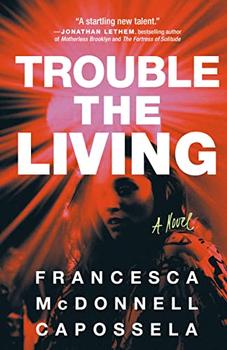Summary | Excerpt | Reading Guide | Discuss | Reviews | Beyond the Book | Readalikes | Genres & Themes | Author Bio

A Novel
by Francesca McDonnell Capossela
I got back into bed, pulling the covers up to my chin. We didn't need to be up for school for another hour, and I could do with a bit more sleep. For a moment, the squeaking of the chair was the only noise. I tried to close my eyes, but Ma kept rocking. I ground my teeth at each whine. I preferred Ma's fixation to Da's lethargy, but I would have preferred the quiet to either.
"I wish your da was man enough for it," she said. "I wish he'd at least let me be man enough."
It was the mantra of a wronged woman, but Ma had made her own bed. She'd been seventeen when she had Enda. The same age I was now. Always a wild one, Ma had worn a leather jacket over her school uniform, had gotten her knuckles rapped daily by the nuns. Back then, it had been even worse: Catholics were denied housing and jobs, subjected to violence, segregated. Unarmed citizens were shot dead en masse by British soldiers. Ma had wanted to be a fighter, had wanted to change things. She'd dreamed of running for office like Bernadette Devlin. But they did worse than rap you on the knuckles for being unmarried, pregnant, and a teenager. As far as I knew, she'd never even considered the alternative: going to England, undoing what had been done.
Ma had been lucky that my father wanted to marry her. It was the best thing that could have happened to her, even if he never let her fight, hardly let her out of his sight. She was pregnant too often to be a revolutionary anyway. Her potential had been snuffed out with her first child. Her possibility dwindled with each of our subsequent births. It was why it was me, and not her, who woke up at dawn to give Conor the bottles. But deep down, the fire still ruled her.
I couldn't sleep with her there. With the noise of the rocking chair and her vague pronouncements. I pulled the covers back down, got out of bed.
"I'm off to shower, then," I said, leaving her where she sat.
I could see her as a teenager, the bump of Enda pushing out the waistband of her knee-length skirt. She'd stayed in school as long as she could, counting down the days until she would leave class and never come back. I sometimes imagined her telling her own mother the news, how terrified she must have been. It was probably why nothing scared her anymore. Nothing could be worse than that original disappointment. She must have been frightened of the baby too, of the shape of her own body twisting in new ways. Of the part of her that would break when he was born. They each blamed each other. My father thinking my mother had trapped him. My mother thinking the same about him. They each felt stuck in different ways. So my father drank, and my mother raged.
I stopped at the window on my way to the bathroom. Outside, the sun was climbing in the sky, and the fields were illuminated with a hazy light. When we were wee, Enda used to take us out there, into the woods around the house. Twilight was the best time for fairy sightings, he said. We brought flashlights and jam jars to collect specimens. The tree branches were like arms in the darkness, and we did not know where to look, moving our eyes from the roots to the sky, afraid of what we might see if our gaze lingered too long, afraid of what we might miss if we did not keep looking. The forest was like an older brother, the way you wanted to know it and yet feared it all at once.
Sometimes, Enda would stop abruptly, and I would walk into him, my little ten-year-old body bumping up against him. He was large enough that I thought he was an adult, though he was only fifteen then. The crown of my head would hit the small of his back, the hollows where his kidneys lay. I would have been looking for tracks in the ground or at a worm, a snail, a leaf. He'd grab my head in the crook of his elbow, hammerlock me, making me laugh. Then he'd stop, still holding my head but gently now, and point ahead to a glimmer in the darkening sky or to some movement behind a tree. We would hold our breaths in fear, in awe. I think he might have really believed in it, some magical force out there. It was easy to, in the woods, when the night swallowed you and there were noises you could not name.
Excerpted from Trouble the Living by Francesca McDonnell Capossela. Copyright © 2023 by Francesca McDonnell Capossela. Excerpted by permission of Lake Union Publishing. All rights reserved. No part of this excerpt may be reproduced or reprinted without permission in writing from the publisher.
Your guide toexceptional books
BookBrowse seeks out and recommends the best in contemporary fiction and nonfiction—books that not only engage and entertain but also deepen our understanding of ourselves and the world around us.